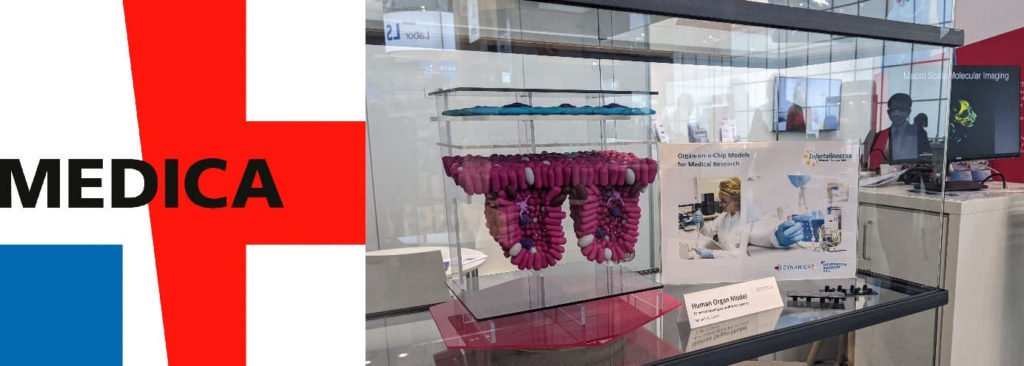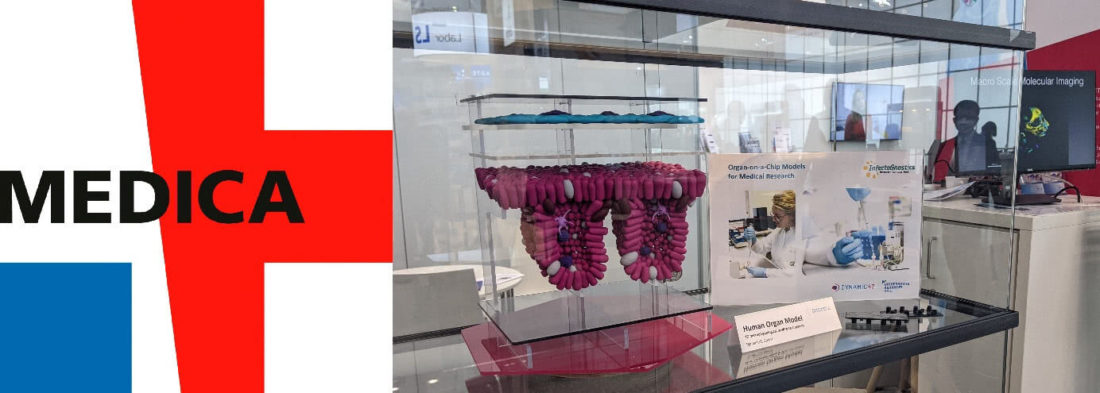Dynamic42 with “Research for the Future” at MEDICA 2021
For over 40 years, MEDICA in Düsseldorf has been known as the world’s largest trade fair for medical technology, laboratory equipment and physiotherapy. This year, due to the Covid-19 pandemic, the fair was once again held in a hybrid format, online and offline. Accordingly, our trade fair theme blended seamlessly into the current framework conditions. As the current pandemic impressively shows, medicine is reaching its limits worldwide when many people suffer from microbial lung infections. This applies to those affected as well as to health systems and society.

Organ-on-a-Chip intestine model by Dynamic42 at the InfectoGnostics research campus stand at Medica 2021.
At MEDICA, our Managing Director Dr. Martin Raasch presented a microphysiological lung model with integrated immune cells, which we have been working on since 2017. The human 3D in vitro lung model is used to study Covid-19 and other lung infectious diseases.
Expert exchange on infectious diseases
Every year, several thousand exhibitors from more than 50 nations take part in MEDICA. This year, as a startup partner of the InfectoGnostics Research Campus, we were represented at the joint booth “Research for the Future”. Together with more than 30 partners from science, medicine and industry, the InfectoGnostics Research Campus Jena primarily develops novel solutions for the safe and cost-effective detection of infectious diseases by means of rapid tests.

Dr. Martin Raasch at the Labmed Forum.
In addition to exhibitor presentations and special shows, MEDICA always offers a sophisticated program of thematically diverse forums, conferences, and lectures. At the MEDICA “Labmed Forum”, the international meeting of experts for laboratory medicine, Dr. Martin Raasch spoke about Dynamic42’s biochips and organ-on-chip technology as a potential tool in Covid-19 research. “The topic met with great interest. It generated attentive questions about the possible applications of organ-on-chip technology and the assessment of the current state of research,” he reports on the productive exchange with colleagues from research and development.
Research on lung-specific infectious diseases such as COVID-19
Viruses can cause serious epidemics that make many sick and even die. At the latest since the beginning of the Corona period, this is nothing new for most people. To contain diseases of this kind now and in the future, new research approaches are needed. We are currently working on one of these: We are developing immunocompetent organ-on-chip models that use novel in vitro approaches and strategies to overcome the current limits of research, in particular on lung-specific infectious diseases. Our goal is to be able to industrially produce the models on high-tech biochips in a timely manner.
This would have two decisive advantages:
- The research is becoming more accurate. Currently, rodents are primarily used as a study model in this area. As a result, the analysis of the course of the disease in infections is restricted several times. Some bacterial toxins are strongly species-specific, so they cause different reactions in mice than in humans, among other things. For example, the bacterial molecule LPS triggers the formation of oxygen radicals and a dysfunction of mitochondria in scavenger cells of mice. This does not happen in human scavenger cells.
- In addition, the structure and functioning of the lungs, as well as the immune system of rodents and humans, differ significantly. We remove this contradiction.
On the one hand, our research contributes to closing the existing gap between animal experiments and clinical trials in humans. On the other hand, it offers enormous potential for the investigation of Covid-19 infections and the testing of active ingredients for drugs to fight corresponding infections.
More interesting articles:
Blog
Organ-on-chip applications by organ type – what has been done?
This blog lists examples of organ-on-chip models by organ type that have been used in the past, providing the respective literature for your reference.
Read MoreBlog
Exploring infectious disease dynamics through organ-on-chip technology
This blog explores established infection models using our organ-on-chip technology and their implications for scientific research.
Read MoreBlog
Immunocompetent Organ Models – the Future of Biomedical Research
One crucial factor that plays a pivotal role in the success of organ-on-cip models is immunocompetence. In this blog post, we delve into the significance of immunocompetence in organ-on-chip models and how it opens new avenues for advancing medical research.
Read More

